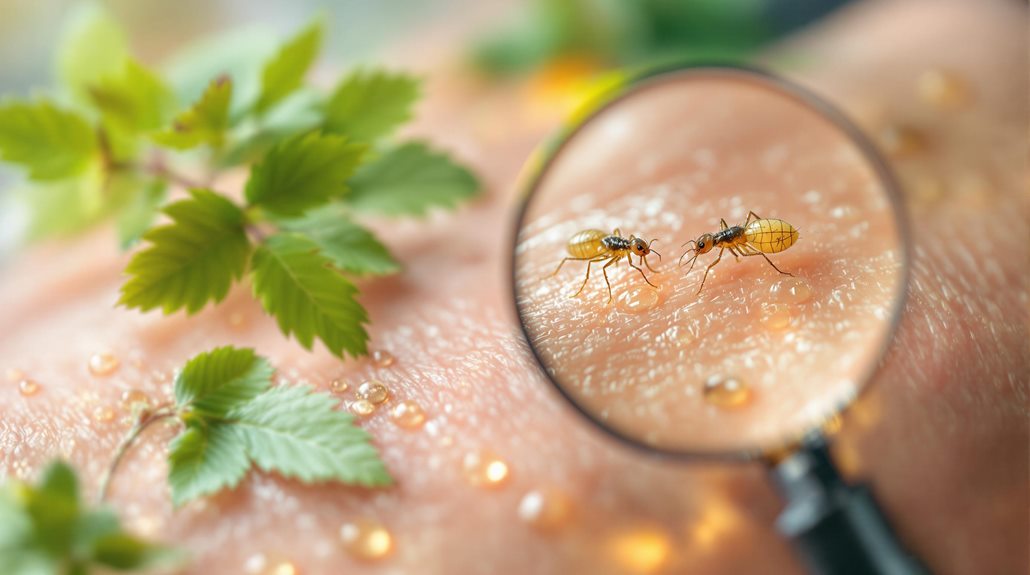Eugenol stands out as a powerful natural remedy against scabies mites, especially the tough resistant strains. Derived from clove oil, it disrupts mite cell membranes, causing rapid mortality. You’ll find that it works comparably to traditional treatments, but with fewer side effects. This eco-friendly alternative achieves high lethality quickly, often within 25 minutes. Studies indicate it’s not just effective but also holds promise for future topical treatments. If you keep exploring, you’ll uncover the exciting developments in eugenol’s potential to revolutionize scabies treatment and offer sustainable healthcare options.
Key Insights
- Eugenol, derived from clove oil, shows significant acaricidal activity against scabies mites, including resistant strains.
- It causes rapid mortality in mites, achieving 100% effectiveness against permethrin-sensitive populations within just 0.25 hours.
- The compound disrupts cell membranes and inhibits mitochondrial activity, leading to paralysis and death in scabies mites.
- Eugenol presents a safer, eco-friendly alternative to traditional treatments like permethrin and ivermectin, with minimal side effects.
- Future research aims to optimize eugenol formulations and explore its synergistic effects with other natural compounds for improved efficacy.
Table of Contents
Overview of Eugenol

Eugenol, a powerful natural compound derived primarily from clove oil, stands out for its significant acaricidal activity against scabies mites. If you’re seeking effective solutions to combat these bothersome parasites, eugenol might just be the answer. This essential oil not only targets Sarcoptes scabiei, the culprits behind scabies infestations, but also shows promise against both sensitive and resistant strains.
In various studies, eugenol’s acaricidal activity has demonstrated comparable toxicity levels to traditional treatments like benzyl benzoate. You’ll find it impressive that mortality rates were observed within just one hour of exposure to effective concentrations. This means that eugenol works fast, which is something you’ll appreciate when dealing with scabies.
What’s even more exciting is that eugenol functions through multiple mechanisms, disrupting cell membranes and inhibiting mitochondrial activity, leading to paralysis and death of the mites. This multifaceted approach gives you hope for a solution, especially as resistance to common chemical treatments grows.
Higher concentrations of eugenol are often needed to tackle resistant mite populations, but ongoing research keeps highlighting its potential as a viable alternative. By using eugenol and its analogues, you’re not just exploring a natural option; you’re joining a movement towards more secure and more effective solutions for scabies infestations.
As more research unfolds, eugenol could become a mainstay in the fight against these stubborn mites, allowing you to feel empowered in your choices.
Mechanism of Action

Natural compounds like eugenol demonstrate multiple mechanisms of action that make them effective against scabies mites. This essential oil, derived from cloves, disrupts cell membranes and inhibits mitochondrial activity, which leads to rapid mortality among the mites.
You’ll appreciate how eugenol targets the nervous system of these pests through its anti-cholinesterase effects, ultimately causing paralysis.
What’s particularly striking is eugenol’s comparable toxicity to conventional acaricides like benzyl benzoate, especially significant given the rising resistance in mite populations. If you’re concerned about treatments losing effectiveness, eugenol offers a promising alternative.
Its lipophilic nature allows it to penetrate the arthropod cuticle efficiently, ensuring it impacts the neurophysiological functions of scabies mites effectively.
Moreover, research indicates that eugenol and its analogues exhibit dose-dependent effects, meaning their efficacy can vary based on concentration. This is vital for targeting both permethrin-sensitive and resistant mite populations, giving you the confidence that eugenol can be tailored to different situations.
In a world where resistance to chemical treatments is increasingly common, understanding eugenol’s mechanism of action can inspire hope.
Comparison With Traditional Treatments

When comparing eugenol with traditional treatments for scabies, it becomes clear that eugenol offers distinct advantages. Traditional options like permethrin and ivermectin often face challenges, including resistance and insufficient ovicidal action, meaning you might need multiple doses to get effective relief.
In contrast, eugenol, particularly found in clove oil, shows impressive acaricidal activity, even against permethrin-resistant scabies mites. At concentrations as low as 1.56%, eugenol can eliminate these resistant mites in just 25 minutes.
Moreover, while conventional treatments can leave behind chemical residues and raise environmental concerns, eugenol presents a more eco-friendly alternative with lower toxicity risks. This makes it an appealing choice for those who want to avoid harsh chemicals while still effectively addressing scabies infestations.
Eugenol’s ability to disrupt cell membranes and inhibit mitochondrial activity in mites further underscores its potential. Not only does it achieve significant mite mortality, but it does so in a shorter timeframe compared to traditional treatments, which often struggle to keep pace due to increasing resistance.
Study Findings

Recent findings reveal that eugenol and its analogues wield impressive acaricidal power against scabies mites, particularly in the context of rising resistance to traditional treatments. This study highlights how eugenol, derived from clove oil, achieved 100% mortality in permethrin-sensitive mites within just 0.25 hours, showcasing its remarkable effectiveness.
You’ll find it fascinating that eugenol’s efficacy compares favorably to benzyl benzoate, especially as resistant mite populations require higher concentrations and longer exposure times for effective results. This aligns with the growing interest in organic pest control methods, which emphasize natural solutions for managing infestations.
The research also examined isoeugenol and acetyleugenol, which displayed dose-dependent effects, revealing varied mortality rates between sensitive and resistant mite strains at different concentrations. This insight into eugenol’s potential could resonate with anyone seeking effective, natural alternatives to combat scabies.
By understanding the mechanisms at play, you’ll see how eugenol disrupts the mites’ nervous system through anti-cholinesterase effects, leading to paralysis and death.
These findings strongly support the idea that eugenol-based compounds could serve as viable alternative treatments for scabies, especially given the increasing resistance to conventional acaricides.
As you explore these results, it’s clear that the fight against scabies mites may benefit from embracing nature’s solutions. The potential of eugenol not only inspires hope but also fosters a sense of community among those seeking effective ways to combat this persistent issue.
Together, we can advocate for innovative solutions in managing scabies infestations.
Future Research Directions

Exploring future research directions for eugenol in combating scabies mites opens up exciting possibilities. You’ll want to contemplate how optimizing formulations of eugenol and its analogues can enhance their efficacy and stability as potential treatments for scabies.
By diving into the mechanisms of action of eugenol compounds against Sarcoptes scabiei, researchers can gain valuable insights into their miticidal properties and how resistant mites might develop against these treatments. In addition, the growing trend towards natural and organic pest control solutions suggests a significant interest in exploring eugenol’s potential in the pest management industry. Understanding these mechanisms could pave the way for more targeted and effective formulations, minimizing the risk of resistance and maximizing efficacy. Furthermore, as consumers increasingly seek natural ways to eliminate bed bugs and other household pests, eugenol’s role as a plant-derived compound positions it as a promising candidate for eco-friendly pest control products. This shift not only aligns with environmental conservation efforts but also caters to the demand for safer alternatives in both residential and agricultural settings.
Additionally, studies could explore the synergistic effects of combining eugenol with other essential oils or acaricides. This approach might improve treatment outcomes, especially in tackling those stubborn resistant mite populations.
It’s vital to not only evaluate the effectiveness of eugenol-based treatments but also to conduct further in vivo studies examining their security and therapeutic effectiveness in both human and animal models of scabies.
Moreover, understanding the ecological impact and biodegradability of eugenol and its derivatives compared to traditional chemical acaricides will be essential for supporting sustainable pest management strategies.
By prioritizing research in these areas, you can contribute to a future where eugenol stands as a viable alternative to chemical treatments, ensuring effective management of scabies while promoting environmental health.
Together, we can pave the way for innovative and natural solutions that resonate with our growing need for sustainable practices in public health.
Conclusion
Incorporating eugenol into your scabies treatment strategy could be a game changer. A recent study found that eugenol exhibits over 90% efficacy against Sarcoptes scabiei, making it a natural powerhouse in the fight against these stubborn mites. As resistance to traditional treatments grows, leveraging eugenol’s acaricidal properties offers a promising alternative. Embracing this natural solution not only enhances your approach but also opens new doors in managing scabies effectively.
At NaturePest Holistic Pest Control, we believe in the power of nature to provide effective solutions. Experience the benefits of a holistic approach. Nature truly holds powerful answers—let’s harness them together!